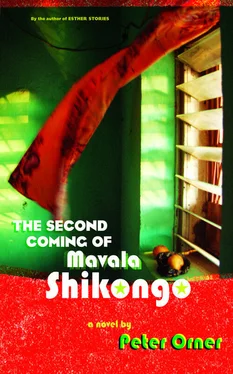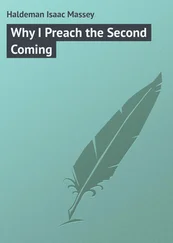And maybe she was more imposing now than she was in the old days, the days Obadiah often waxed over. Had she been Turkish, he’d say, my wife would have been a pasha. Her standing there in her brutally ironed gray dress, holding that fork. Why waste words when you can lash with your eyes? Cowards. Leave that girl’s life alone. Enough for her already without you sloths mongering. Father? What father? Who cares about a father? Any.
Late. Pohamba pounds the wall. “My dreams are too loud,” he says. “Aren’t yours?”
“No.”
“It’s her. She’s walking on my head with those heels.”
“Go to sleep.”
“She’s put me, you know, in a manly state.”
“I don’t want to hear about it.”
“And you’re not hungry?”
We had chunk meat for dinner, which I now can’t remember eating. “What have you got?”
“Canned snoek.”
“Use the Primus?”
“No. Outside.”
In front of our rooms he builds a small fire by the garbage pit. I hold my flashlight while he pours oil into one of Antoinette’s big black pots. He slaps the fish out of the tin. “One-sixty k from the ocean,” he says. “You wouldn’t know it from the fish we eat.”
I listen to the crackle of the oil. Above, a crowded bowl of stars and a dented orange moon so low in the sky, it looks like it’s squatting in the veld.
“Another thing.”
“What?”
“Lowest population density of any country in the world, and I live in a two-and-a-half-by-four-meter room. Explain the incongruity.”
“I can’t.”
“Have I told you about my brother Moola, the scientific socialist?” he asks.
“Is he the one who lost his hand at the canning factory?”
The wind is so dead at this hour, I can hear him swallow. He doesn’t laugh. “That was Simeon.”
“Oh.”
“My father’s sister’s child. To myself, this is a brother. I called him Moola. His mother called him Bonifacius. We went to junior primary together at Otavi. Then to Dobra for high school. The boy liked to dance, I tell you. Run also. Up in the mountains above school. Had he lived he would have become as fast as Frankie Fredricks. Running in the Olympics. Money, cars, women. He also read more than any of us. Fuck this school, he said. He said the rest of us — no matter how poor our fathers — were peons of the whites. Sellouts. He said he was willing to die so we could rule ourselves and work together, because, he said, you, my friends are the proletariat … It was going to be beautiful. We were going to build community halls, post offices. He always talked like that, us holding hands and building post offices together.”
The oil in the pot splutters and Pohamba pokes at the fire with the edge of his boot.
“We formed an underground organization — Moola called it the League of the Just. We would meet in the veld, and Moola would teach us, lecture us. So when the time came, I left school and followed Moola north and joined the struggle. Understand, we hardly had boots. They had planes and tanks. But wasn’t our cause righteous, eh? ”
He pauses, cracks his knuckles, all of them.
“Myself and Brother Moola. We were part of a platoon that worked reconnaissance. In country. We’d spend our days sleeping in the bush. Nights, we’d sabotage. We were saboteurs. Ha! Our job was to create fear. Not to win, only to keep the whites afraid. We’d get them while they slept. We’d steal their women, their children. We were spooky terrorists. We were the gorilla in guerrilla, get it? Oh, were we good! And Moola was our fearless leader. Then — it happens. We’re all sleeping in the bush, middle of the day, up near their air base at Ruacana, and — suddenly — a helicopter lands on us like a weaver coming home to roost. Two Boers hanging off that metal bird with howitzers. Out of seven comrades, four dead, rest of us wounded. Myself in the left leg.”
He swallows loud, and rolls up his left pants leg.
It’s small for shrapnel, it seems to me. Still, I gasp. Holy shit.
He’s quiet for a while, satisfied. Lets the thud-like truth of the wound settle.
“Only one of us, you see, wasn’t there. One of us, you see, had, fortuitously, crept away before the ambush. Have a good sleep, my comrades. Oh, he used to cheer the good fight with his right hand raised! Mandela! Nujoma! Toivo ja Toivo! We tracked him the next day.” Pohamba burps, looks at me over the pot. “Watch the ones who talk too much.”
“Why’d he do it?”
Now he laughs, waves his spoon around. “Why does anybody do anything? Money or women. In this case it was money.” He sings, “ Money makes the world go round the world go round the world… We found five hundred rand in his boots. A few thousand more in his underwear. My dear brother sold us. He was trying to get out. Maybe he wanted to preach the revolution in Paris or somewhere. Fuck some French girls for Trotsky. I don’t blame him. Do you think I blame him?”
He reaches into the pot and feels the fish with his fingers.
“The fish is done.”
“What did you do to him?”
“Oh, the natural thing.” Pohamba takes his spoon and glops some fish on my plate.
“What’s that?”
“Eat your fish. Don’t you want some chutney?”
I point the light in his face.
“What’s the natural thing?”
He yawns. “We tied him to the back of a lorry and drove. Drove till the veld shaved the skin off his body. You could hear him moaning on the Champs-Elysées. Then we cut him loose and let the birds eat out his eyes.”
Pohamba takes the pot off the fire and sets it on a rock. I hand him back my plate. I want to believe him. I want to believe him in the way you want to believe the one story people tell (he told so many, but he really told only one) to be the truth. He’s stacking himself up against the soldier.
“She’s not that hot,” I say.
“No, only that arse.”
He hands me back my plate heaped with blackened snoek. I shove the fish in my mouth with my hands. When I’m through with my second plate, I watch him eat. Pohamba’s a dainty eater. He changes the subject, tells me how he’d like to open a shop at Goas and sell cooldrink and candy to the boys. Easy money, he says. A monopoly. Some cooldrink, some chocolate. Simba raisins and peanuts. “Wouldn’t you like to open a shop?” he says.
We pretended not to notice. Bastard children were normal for country people, farm people. Or men. (Pohamba claimed legions.) Not for a woman teacher. Not for a woman teacher at a Catholic school. And certainly not for a woman teacher at a Catholic school where her brother-in-law is principal. To parade around as if it was nothing (as Miss Tuyeni put it to Antoinette, overheard by Obadiah, who reported to us) was more than an embarrassment; it was a disgrace. The girl goes off to fight a war and now look at her, toting a child without a husband. Which is what men want. Any man. To plant seeds without staying around to water the garden. The price respectable women charge is marriage. There is no other fee.
But not only Miss Tuyeni clucked. It was all of us. Nobody greeted Mavala Shikongo when she returned. And everyone, myself included, wore an air of Nope, we’re not surprised. We expect nothing less than humiliation here.
In morning meeting, the principal acted as if she’d never left. Vilho had been covering her classroom, running back and forth across the courtyard. All day, every day, for nearly a month, he had done his best to control two rooms of squalling boys, his own Standard Fours and her sub b’s. Supposedly, the principal had put a call into the ministry for a replacement teacher, but no one had turned up, and now no one needed to.
Читать дальше












